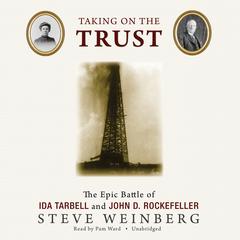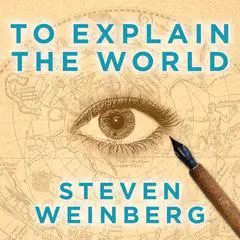 Play Audiobook Sample
Play Audiobook Sample
The First Three Minutes: A Modern View of the Origin of the Universe Audiobook
 Play Audiobook Sample
Play Audiobook Sample
Quick Stats About this Audiobook
Total Audiobook Chapters:
Longest Chapter Length:
Shortest Chapter Length:
Average Chapter Length:
Audiobooks by this Author:
Publisher Description
A Nobel Prize-winning physicist explains what happened at the very beginning of the universe, and how we know, in this popular science classic.
Our universe has been growing for nearly 14 billion years. But almost everything about it, from the elements that forged stars, planets, and lifeforms, to the fundamental forces of physics, can be traced back to what happened in just the first three minutes of its existence.
In this book, Nobel Laureate Steven Weinberg describes in wonderful detail what happened in these first three minutes. It is an exhilarating journey that begins with the Planck Epoch - the earliest period of time in the history of the universe - and goes through Einstein's Theory of Relativity, the Hubble Red Shift, and the detection of the Cosmic Microwave Background. These incredible discoveries all form the foundation for what we now understand as the "standard model" of the origin of the universe. The First Three Minutes examines not only what this model looks like, but also tells the exciting story of the bold thinkers who put it together.
Clearly and accessibly written, The First Three Minutes is a modern-day classic, an unsurpassed explanation of where it is that everything really comes from.
Download and start listening now!
"This was very fascinating and challenging and my only complaint is that it was perhaps too technical to suit its purpose, which is supposed to be to clarify the main evidence for and about the big bang theory for a lay audience. Though that may just be my ignorance speaking :)"
— Josh (4 out of 5 stars)
Quotes
-
A most remarkable achievement...presented with clarity...and great scientific accuracy.
— T.D. Lee, Nobel Laureate in Physics -
Weinberg builds such a convincing case...that one comes away from his book feeling not only that the idea of an original cosmic explosion is not crazy but that any other theory appears scientifically irrational.
— Jeremy Bernstein, New Yorker -
His book is science writing at its best.
— Martin Gardner, New York Review of Books -
The book is the first I have seen to put the details, both historical and conceptual, of the origin of the Universe within the grasp of the general reader... As such, it is a tremendous service to us all.
— Isaac Asimov
The First Three Minutes Listener Reviews
-
" Being a flighty little bird, this led me to the 'Poetic Edda' (add to Never Finished since I didnt have Wikipedia), then to the 'Ring des Nibelungen'. Good times. "
— Kevin, 1/19/2014 -
" One of the best for general consumption science books I have ever read. Weinberg performs masterfully at laying out the evidence for how universe evolved and why it must be so. "
— Jesse, 1/15/2014 -
" pop science account of the state of affairs in cosmology with regard to the early universe. this book spawned about 65 spinoffs by astrophysicists of various degrees of competence as everyone rushed to deliver "the last three minutes", "the next three minutes", etc, etc, etc. "
— dead, 10/30/2013 -
" It was probably a very good book when it came out, but it's desperately out of date. The edition I read was very proud of updating to include cosmic microwave background anisotropy. Pass on this one, it's not going to give you a good view of the field. "
— Jax, 10/28/2013 -
" This is the book that turned me on to physics. Sure, it was Carl Sagan who turned me on to science and scientific thinking (skepticism), but Weinberg's "The First Three Minutes" made me realize that all of my most profound questions had answers in the field of physics. "
— John, 7/8/2013 -
" I'm not a physicist but I thought this was a very useful introduction to the thinking in physics at the time. It's probably a bit dated now. I find it fairly clear reading and enjoyable. "
— Charles, 5/20/2013 -
" This is a decent, if a bit dated, layman's introduction to the beginning of the universe. I'd recommend it for anyone who thinks physics is cool, but doesn't understand why we'd want to study the beginnings of the universe, or the building blocks of nature. "
— Kohl, 1/29/2013 -
" This book attempts to explain what happened in the first three minutes after the big bang... They think they understand what went on up to about that very very first 'mondoquadzillionth' of a second. Enjoyed the book, but only grasped about a second and a half. "
— Braden, 12/10/2012 -
" Very dense and highly technical details of what happened in the first three minutes of origination of the Universe, alongside how were those details discovered. Fascinating yet not easy to understand at all. "
— Ashishg, 7/25/2012 -
" a book for those who want to know more about big bang and universe. "
— Amir, 9/4/2011 -
" An interesting book although sometimes hard to understand. It's interesting to see how views of the universe's beginning have changed since this book was published. "
— Natasha, 7/18/2011 -
" Interesting read, but very out of date even with the "updated" afterword. "
— Corinna, 1/8/2011 -
" Even though the author claims the subject is dumbed down, this book is difficult for the casual reader. "
— Stan, 11/22/2010 -
" Read this to a blind friend and wasn't at all sure I'd like it, but I actually did ... quite a lot. "
— Beth, 11/15/2010 -
" An interesting book although sometimes hard to understand. It's interesting to see how views of the universe's beginning have changed since this book was published. "
— Natasha, 11/10/2010 -
" I'm not a physicist but I thought this was a very useful introduction to the thinking in physics at the time. It's probably a bit dated now. I find it fairly clear reading and enjoyable. "
— Charles, 7/18/2010 -
" This book attempts to explain what happened in the first three minutes after the big bang... They think they understand what went on up to about that very very first 'mondoquadzillionth' of a second. Enjoyed the book, but only grasped about a second and a half. "
— Braden, 11/25/2009 -
" One of the best for general consumption science books I have ever read. Weinberg performs masterfully at laying out the evidence for how universe evolved and why it must be so. "
— Jesse, 8/16/2009 -
" This is a decent, if a bit dated, layman's introduction to the beginning of the universe. I'd recommend it for anyone who thinks physics is cool, but doesn't understand why we'd want to study the beginnings of the universe, or the building blocks of nature. "
— Kohl, 1/1/2009 -
" Interesting read, but very out of date even with the "updated" afterword. "
— Corinna, 12/16/2008 -
" Read this to a blind friend and wasn't at all sure I'd like it, but I actually did ... quite a lot. "
— Beth, 5/1/2008 -
" pop science account of the state of affairs in cosmology with regard to the early universe. this book spawned about 65 spinoffs by astrophysicists of various degrees of competence as everyone rushed to deliver "the last three minutes", "the next three minutes", etc, etc, etc. "
— dead, 4/11/2008 -
" Being a flighty little bird, this led me to the 'Poetic Edda' (add to Never Finished since I didnt have Wikipedia), then to the 'Ring des Nibelungen'. Good times. "
— Kevin, 4/4/2008 -
" a book for those who want to know more about big bang and universe. "
— Amir, 9/1/2007
About Steven Weinberg
Steven Weinberg received the 1979 Nobel Prize for Physics for his work in unifying two of the fundamental forces of nature, and in 1991 he was awarded the National Medal of Science at the White House. His earlier prize-winning book The First Three Minutes is the classic account of the “Big Bang,” the modern theory of the origin of the universe. Among his other books are The Theory of Subatomic Particles and Gravitation and Cosmology: Principles and Applications of the General Theory of Relativity. Steven Weinberg is a member of the Royal Society of London as well as the US National Academy of Sciences, and has been awarded numerous honorary degrees, most recently from Columbia University and the Universities of Salamanca and Padua.
About Raymond Todd
Raymond Todd is an actor and director in the theater as well as a poet and documentary filmmaker. He plays jazz trombone for the Leatherstocking quartet, an ensemble that gets its name from one of his favorite Blackstone narrations, The Deerslayer. Todd lives in New York.











